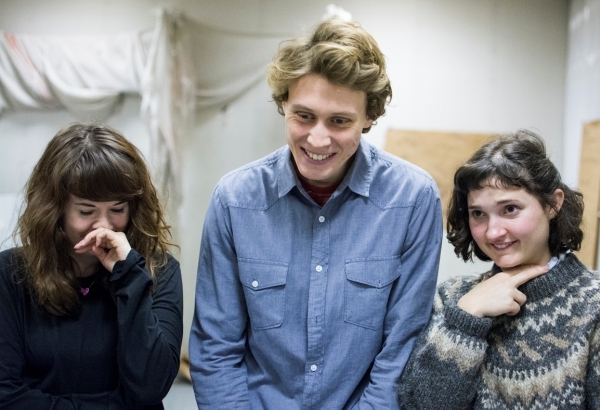David Aula and Jimmy Osborne on adapting The Cement Garden

© Rebecca Pitt
Venture into the labyrinth of tunnels under Waterloo Station during the next six weeks and you might be surprised by what you find. The second incarnation of VAULT Festival is temporarily occupying these gloomy, atmospheric arches, filling them with art and live performance, opening this week with Fear and Loathing in Las Vegas. The festival’s other headline show, a new adaptation of Ian McEwan‘s unsettling coming-of-age novel The Cement Garden, seems particularly suited to these dark and claustrophobic surroundings. But for adapters David Aula and Jimmy Osborne, McEwan’s tale is about so much more than its disturbing surface.
“The book deals with some very difficult themes on the face of it,” says Osborne, “but underneath I think at its heart the story’s about bonds and how families – as weird and dysfunctional and messed up as they all are to some extent – try and keep going, even sometimes against odds that are very stacked against them.”
The novel is told from the perspective of teenager Jack, who is left home alone with his three siblings following the death of their parents. Over the course of one summer, the children retreat further and further into their own world, turning their backs on society and living by their own rules. Osborne describes the book as “absorbing and intense”, while Aula was instantly struck by its dramatic potential.
The production at VAULT Festival is the culmination of several years working on the idea of adapting the novel. Director Aula was first attracted to The Cement Garden at university, when he performed a devised version of the story with a group of fellow students. This was seen by Osborne, after which Aula remembers that the pair “agreed that it was a lot of fun, it had a lot of great bits in it, but wasn’t particularly tight on the writing”. It was at this point that Osborne became involved as a writer, and though the collaborators have worked together on other projects since, their thoughts kept returning to The Cement Garden.
“I increasingly find myself coming back to the idea of it being a very private story,” says Aula, attempting to explain the appeal of the novel. Whereas readers encounter this private story alone, Aula and Osborne are interested in what happens when it is moved into a public space. “What’s it like to have that experience with someone else sitting next to you, who you either know really well or don’t know at all, having the exact same experience?” Aula asks. “And can we as an audience come to a point where we just look at some of this very odd behaviour and recognise both its normality and its extremity?”
Like any adaptation, this has raised challenges. Both Aula and Osborne were fascinated by the figure of Jack as the narrator at the centre of the story, but this posed difficulties for dramatisation. “That has been very interesting, to work out a way of presenting that dramatically or theatrically; the idea that he’s both in the moment and recollecting it, in a funny way,” Aula reflects. To get around this, they have come up with a framing device which allows the youngest of the four children to return to his past several years later. Aula explains that “it’s like he’s discovering his younger self as he’s being told the story by his older brother”.

© Rebecca Pitt
As well as discovering a new way of telling the story and bringing its characters to life, the space under Waterloo Station has been of huge importance to this production. Aula was excited that the particular tunnel in which the performance is taking place has two levels, allowing the show to play around with the idea of space in the story, while he was also attracted to the bleak, industrial feel of the venue. “In the book they’re on their own because all of the rest of the houses around them have been knocked down for a motorway to be built,” he explains. “It’s rather nice with the sound of the trains going overhead, because you can imagine this house being the only house left under a bypass. And the industrial element of it as well gives us the sense of a house that’s almost in the stages of demolition and gives our main character Jack the ability to use it as a huge climbing frame, which is rather exciting.”
In contrast with the dark associations of the staging, however, Aula and Osborne are keen to bring some light to their interpretation. “One of the key drivers for me through the whole rehearsal process has been the idea of playing against ideas or playing against themes,” Aula tells me. “A lot of the work we’ve been doing is around how we create hope and lightness and imagination and fun in a story which is dark and disturbing and I suppose hopeless in some respects.” Osborne stresses that they are hoping to highlight the novel’s “subtle playfulness”, adding, “in your adolescence seriousness and playfulness get mixed up at times, and they can become kind of intertwined and confused”.
During the process of refining their version of the story, Aula and Osborne have been lucky enough to get the input of McEwan himself. The writer has read the script and attended a rehearsed reading of the show at the National Theatre Studio, which both adaptors describe as an extremely valuable experience. His main encouragement was for Aula and Osborne to take the piece in their own direction. “He’s been very generous in giving us that freedom, as well as the time that he has given us,” says Osborne, while Aula adds that “he’s been very permissive, very supportive in that sense of saying ‘go for it, I trust you'”.
Having spent so long teasing out the intricacies of this story, what have Aula and Osborne learnt about the art of adaptation? For Aula, it’s all about “connecting to the characters and events”, while maintaining a constant awareness of why each piece of narrative is being adapted. “I think just like fidelity in any other context, it’s about the strength of feeling,” he explains. “The rule for us is that we wouldn’t keep something just because it’s in the book, we’d have to feel it connected to what we were creating as well. True fidelity doesn’t come from duty, it comes from really wanting to stay close to it.”
Meanwhile Osborne describes his script as a “robust battle plan”, one built to capture the spirit of McEwan’s novel and withstand the addition of the theatrical elements added by Aula. He also thinks that adapters need “a love of the original novel and then also a kind of bravery to go away and come up with a new way of telling that story”. As he puts it, “the main thing is to be quite brave and not worry about doing things differently to the book, while at the same time trying to keep the spirit of the book in mind.”
The Cement Garden is at VAULT Festival from 28 January – 8 March.










